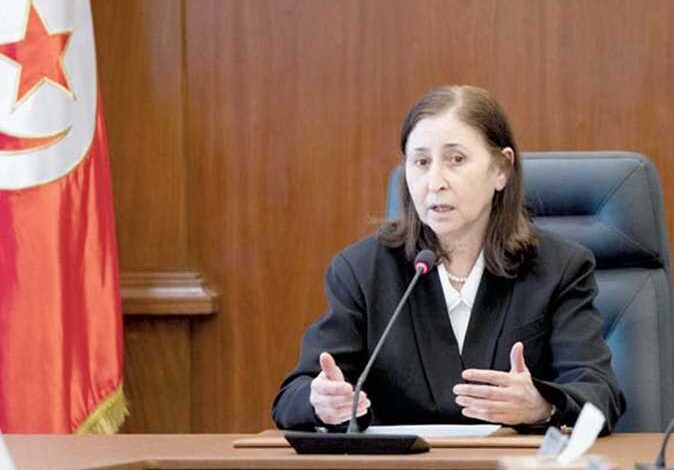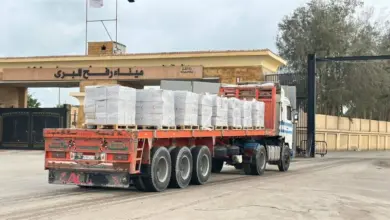
In this exclusive interview conducted in Japan, on the sidelines of her participation in the TICAD summit, Tunisian Prime Minister Sarah Zaafrani hailed the bonds between Egypt and Tunisia, which she explained stand strong at all political and commercial levels, and discussed the regional situation at large.
She discussed preparations for for the upcoming Egyptian-Tunisian Joint Higher Committee in Cairo this September, how united Egypt and Tunisia are regarding the the Palestinian cause and the fight against illegal immigration.
How would you describe the relationship between Egypt and Tunisia?
The relationship between Egypt and Tunisia stands distinguished within political and economic levels. We are currently working on the preparations for the 18th session of the Egyptian-Tunisian Joint Higher Committee, scheduled to be held in Cairo from September 8-11.
As the two countries work in accordance with the directives of Egypt’s President Abdel Fattah al-Sisi and Tunisian President Kais Saied to strengthen economic, trade and cultural relations, promote investment in both countries, and organize continuous visits by Egyptian businessmen to Tunisia and Tunisian businessmen to Egypt, there is also interest in boosting trade exchange given the size and nature of the partnership between both nations.
There are numerous investments in Egypt, totaling approximately US$45.5 million, in areas such as oil exploration, agriculture, and the cable industry.
There is continuous bilateral communication between both countries to coordinate their various positions before the UN and international organizations, particularly regarding common issues related to the criminal Israeli war on the Gaza Strip and issues related to the future of the Arab region and the Middle East, in addition to issues related to dealing with illegal immigration.
Indeed, Egypt has seen tremendous achievements over the past years, in terms of urban development, housing projects, and the construction of the new administrative capital.
This is proof that Egypt will remain the heart of the Arab world in all projects and fields.
I affirm that holding the Business and Investment Forum, in which the General Union of Chambers of Commerce participates on the Egyptian side, and the Tunisian Confederation of Industry, Trade and Handicrafts, along with investors, will be another pillar in advancing and deepening bilateral relations between the two countries.
Tunisia is not far from Libya, which is of great interest to Egypt. What is your country’s vision for calming and stabilizing the situation in Tripoli?
Yes, we have a strong, fraternal relationship between Libya and Tunisia.
Just as Egypt is doing for Libya, Tunisia is working to support the path to political stability in Libya and stands firmly with the Libyan people at all stages.
There is also ongoing work to strengthen bilateral cooperation. Economically, commercially, and investment-wise, we are creating a favorable environment for expanding partnerships between business-people from both countries.
We are also working to implement the work of the Libyan-Tunisian Joint High Committee, despite the circumstances surrounding Libya.
What about the criminal war on the Gaza?
We share with Egypt the same pain regarding the Palestinian cause, particularly regarding the serious violations of international and humanitarian law by the Israeli occupation, which is committing the most heinous crimes.
There is consensus on the need to unify international and Arab positions to support the Palestinian people’s rights to freedom and the establishment of their independent state.
Tunisia stands firmly and steadfastly with the Palestinian people and supports Egypt’s efforts to achieve a ceasefire. We support the establishment of a Palestinian state with Jerusalem as its capital, and for the Palestinian people to enjoy the establishment of their state on all their lands.
We also believe that Tel Aviv’s crimes against the Palestinian people will not be forgotten.
Tunisia participated as a representative in the ninth TICAD summit. How did it benefit your country?
Yes, I participated at the head of a high-level delegation in the ninth TICAD Tokyo International Conference on Development.
There are numerous benefits for Tunisia through this participation, particularly in the economic field, and there are projects being implemented with the Japan International Development Agency (JICA).
Therefore, there is joint bilateral cooperation between Tunisia and Japan, and the agency participates in financing projects.
Tunisia desires to deal in accordance with multilateralism, and to become a regional center between Japan and Africa.
We have a historical relationship with Japan spanning nearly 70 years, and we are working to strengthen these ties economically through financial and technical support and creating an environment conducive to attracting Japanese investments in Tunisia.
Previously, Tunisia successfully organized the eighth TICAD summit, which was hosted by Tunisia in 2022 under the auspices of President Kais Saied.
What were the most prominent issues you raised at the TICAD conference, and were they limited to Tunisia?
Japan attaches much importance to its relations with Tunisia, which plays a key role in regional stability. Tokyo is eager to continue cooperation to resolve Tunisia’s water shortage problem.
There are active negotiations underway to conclude a bilateral investment agreement to enhance economic cooperation between the two countries. It was not limited to bilateral multilateral cooperation, but Tunisia presented its vision on the conflict in the Middle East region, at the heart of which is the Gaza issue.
Economically, we presented Tunisia’s vision for holding a Tunisian-Japanese economic forum next year in Tokyo or Tunis with the aim of strengthening cooperation and partnership between the two countries.
This forum will provide an opportunity for new horizons of cooperation in various fields, especially technological cooperation. Japan has broader scope in the field of using Artificial Intelligence, and there are broader prospects, especially since Tunisia has youth resources that include competencies in this regard.
During the visit, it was agreed to support industrial vocational education by providing educational grants from the Japanese side for outstanding Tunisian students, especially with the increasing number of students seeking education in Tokyo and other Japanese cities, in addition to the JICA project.
Tunisia is considered to be at the heart of Africa. What are your country’s prospects for cooperation with the continent?
Tunisia’s geographic location, along with its political, social, and economic stability, makes it a prime location for attracting Japanese companies seeking to expand into Africa. Therefore, we launched the “Discover Tunisia” initiative, providing investment opportunities.
Tunisia is also a member of the African Continental Free Trade Area, as well as the Common Market for Eastern and Southern Africa, so we are striving for Arab-African development.
As evidence for what I am saying, we have 21 Japanese investments worth about $430 million, which has been beneficial by providing about 16,000 job opportunities. This did not come out of nowhere. Tunisia has new investment laws to attract investors, and Cairo also has these laws, which comply with international standards aimed at enhancing investor protection.
Tokyo sees Tunisia as a partner for growth and a bridge to strengthen the partnership between the land of the samurai and the African continent.
This allows for the expansion of bilateral industrial partnerships in high-value sectors, such as modern technology, electronics, and renewable energy.
Therefore, just as we invited Japan, we have also invited Egypt to participate in the World Junior Chambers Economic Forum, which Tunisia will host in November.
Tunisia faces challenges related to combating illegal immigration. What is your vision for a solution?
Tunisia is making strenuous efforts to combat illegal immigration and is working to facilitate the voluntary return of victims of criminal networks. This must be combated internationally, and the issue requires the intervention and cooperation of all countries by working to establish development projects in the countries from which migrants flee, despite their significant resources.
Therefore, the US and Europe must harness development projects to contribute to economic reform in developing countries.
Unfortunately, every now and then, we see migrants from African countries, including women and infants, whose boats sink off the Tunisian coast, using pneumatic tires.




